- Home
- Harlan Ellison
Approaching Oblivion Page 3
Approaching Oblivion Read online
Page 3
No, it is an Ellison closer to that scabby kid in Lathrop’s dust who confronts you now. When I signed the contract for this book, I was prepared to ring out clarion calls about keeping the heat on The Establishment, making a better condition of life for everyone. But it’s four years later and Vacca’s The Coming Dark Age has been published which, if you haven’t read it, you should go out at once and get it, and it plays the final notes of the death rigadoon for Society As We Know It…so why should I bother.
We are clearly on a slide-trough to destruction.
Watergate, the energy crisis, apartheid, holy wars, venality, vigilantism, apathy, corruption, fanaticism, racism, the deification of stupidity…none of these would be so terrifyingly prophetic of our rush to the grave were it not for the capabilities we possess to do ourselves in so efficiently and swiftly. The great lizards owned the planet for something like 130,000,000 years, but they didn’t have slant-well drilling, pesticides, pollution, fast breeders, defoliants, demagogues, thermonuclear warheads, non-biodegradable plastics, The Pentagon, The Kremlin, The General Staff of the Peoples’ Army, Ronald Reagan, Richard Nixon and the FBI.
Poor lizards. What joys they missed. Had they not been so culturally deprived, they might have sunk into the swamps in a mere three thousand years.
If it sounds as though I still care, disabuse yourself of the idea. I’ve done too many college lectures. I’ve seen too many classrooms filled with the no-neck children of parents whose motivation in life was, “My kid’s gonna have the education I dint have.” I’ve seen too many of those kids nodding off between Chaucer and Suckling, and I have grown disenchanted. You’ve let it ride too long, troops. You’ve frittered and fiddled and enshrined the hypocrites and slaughtered the dreamers, and now you can only get five gallons in your gas tank.
And if I’ve learned a lesson from that terrible time of fire and blood, it is that most reformers in the pure sense are clowns, shouting into the wind, balming their own guilts and making no ripple whatever. For every Gandhi or Nader or Bertrand Russell or Thoreau, there are a hundred thousand Nixons to stifle freedom of expression, joy of living and preservation of the past. (My self-disillusionment in this area shows itself in the story “Silent in Gehenna,” included in this collection.)
As for the future, well, I’m brought in mind of a quote by Albert Camus:
“Real generosity toward the future lies in giving all to the present.”
And the present is being ripped-off and screwed-over by the omnipresent philosophy of I’m all right, Jack, which is a working-class Englishman’s term for screw you, baby, I’ve got mine. It’s your future, and you don’t seem to give a royal damn what happens to it.
So the Ellison who writes this is a little more calloused and tougher than the one who went to Selma with King in March of 1965, less hopeful and prone to sweeping gardyloos. The Ellison sitting here now is an older version of the kid from Painesville who stopped trying to buck the tide of bigotry and stupidity and merely cut out to find the rest of the world.
Had I done this book in 1970, as originally planned, you’d find in this space a clarion call to revolution, a resounding challenge to the future. But it’s four years later, Nixon time, and I’ve seen you sitting on your asses mumbling about impeachment, I’ve gone through ten years waiting for you to recognize how evil the war in Vietnam was, I’ve watched you loaf and lumber through college and business and middle-class complacency, pursuing the twin goals of “happiness” and “security.”
What fools you are. Happy, secure corpses you’ll be.
You’re approaching oblivion, and you know it, and you won’t do a thing to save yourselves.
As for me and you in this literary liaison, well, I’ve paid my dues. Now I’m merely going to sit here on the side and laugh my ass off at how you sink into the quagmire like the triceratops. I’m going to laugh and jeer and wiggle my ears at your death throes. And how will I do that? By writing my stories. That’s how I get my fix. You can OD on religion or dope or war or McDonald’s toadburgers, for all I care. I’m over here, watching you, and giggling, and saying, “This is what tomorrow looks like, dummy.”
And if you hear me sobbing once in a while, it’s only because you’ve killed me, too, you fuckers.
I’m stuck on this spinning place with you, and I don’t want to go, and you’ve killed me, and I resent it, and the best I can do is tell my little tomorrow stories and keep laughing as the whirlwind whips the dirt in the playground at Lathrop grade school into an ominous dust-devil.
HARLAN ELLISON
Los Angeles
January 1974
1.
Knox
In Germany they first came for the Communists and I didn’t speak up because I wasn’t a Communist. Then they came for the Jews, and I didn’t speak up because I wasn’t a Jew. Then they came for the trade unionists, and I didn’t speak up because I wasn’t a trade unionist. Then they came for the Catholics, and I didn’t speak up because I was a Protestant. Then they came for me—and by that time no one was left to speak up.
—PASTOR MARTIN NIEMÖLLER
They flushed the niggers from underground bunkers, out near the perimeter, and Charlie Knox killed his because he thought the boogie was going for a gun. As it turned out, he wasn’t: but Knox didn’t know that when he let fly.
Earlier that day Knox had gone to a fitness session and the ward Captain had reprimanded him for haste in firing. “These aren’t shootouts, Knox. The idea is to level the weapon and point it in the right direction, not blow off your own leg. Now take it again. Another hour on the range, Saturday.”
Even earlier that day, Knox had had lunch with his wife; he had done the cooking himself, and they had discussed how difficult it had become to get fresh vegetables, particularly carrots, since the new emergency measures had been put into effect. “But it’s necessary,” Brenda had said. “At least until the President can get things under control again.” Knox had said something about radicals and Brenda had said, you can say that again.
And at the start of that day, Knox had found sealed instructions from the Patriotism Party in his readout tray at work. He slit open the red, white and blue plastic packet and saw he was scheduled for an operation that night.
Now they came up out of the ground like potato bugs, black and fat from living off starches, and clouds of infiltration gas billowed out after them. Knox’s flushing team waited with truncheons raised, catching the first two across the skulls with beautiful backswings. They dropped, half in and half out of the hole, and the flushers grabbed them by their collars. They pulled them out fast and slung them across the grass so those who followed wouldn’t find the passage blocked.
They hadn’t counted on more than a couple of exit holes. Suddenly the ground started to erupt spooks and they were jumping up and out all around the team. The flushers let their truncheons hang by the lanyards and went to more effective weaponry. Knox saw Ernie Buscher unship his scattergun and blow two of the jigs to pieces as they scrambled out of the ground. Pieces of nigger meat went east in a spray.
That was the moment when an owl hooted in a tree off to Knox’s right, and he turned his head to look. “Behind you, Charlie!” Knox heard Ted Beckwith’s warning. He turned back from the owl sound and right behind him the turf had popped open and there was a dinge crawling out like an earthworm. There wasn’t enough moon to see what he looked like, but Knox took a swing with his truncheon and missed. “Stop!” he yelled, but the jig went right on getting to his feet and blundering away. “I said: stop, nigguh!”
And the boogie half-turned, and in the dim light Knox thought he was reaching inside his jumper jacket for a gun. Knox reacted with twice his best drill speed, had the banger off its Velcro pad and working before the shine could pull his hand out of his clothes. The spook’s head opened up like a piece of overripe fruit and Knox was startled to see the stuff inside sparkled in the night. Then it went all over the place.
“Oh my God,” Knox said.
He heard his voice as though it had come from someone standing very close beside him; but it had been himself.
He heard the words repeating themselves, fading away, dimmer and dimmer, a canyon echo disappearing in his mind.
There was firing going on all around him now. The bright golden flashes of scatterguns and bangers lighting up the clearing and reflecting off the perimeter. Then suddenly there was the shrill whistle of the ward Captain’s warning, three shorts and a long, and the blasting became more sporadic, then finally stopped.
“All right, you men! That’s enough! No one authorized—this! Now knock it off, right this minute. We’ll take these people in.”
Knox realized he was standing where he had been standing for a long time. Ted Beckwith came to him and said, “You okay, Charlie?”
After a few moments Knox turned his head to stare into Beckwith’s really handsome face, and he heard that self that was himself saying, “My God, he just split open…”
Charlie Knox is. A man.
Who.
Stands 1.9 meters, weights 191 pounds, has brown wavy hair cut short, squints slightly out of brown eyes, wears a mustache that is thick and brown and is kept neatly trimmed but not obsessively so, works out with 50 lb. barbells twice a day for ten minutes each session, drinks milk when he can get it and nothing but water when he can’t, has had whooping cough, measles, mumps, chicken pox and twice broken his left forearm but otherwise is healthy.
He is thirty years old, does not like rings or other jewelry, has been married to Brenda for nine years, has two children (Rebecca, 8 and Ben, 7), never wears a hat, likes cold weather, shuffles his feet through the fallen leaves when he walks, has perfect pitch when he sings, likes to whistle, has never read a book all the way through, joined the Party two years ago at the compulsory outside age limit, has a diamond-shaped birthmark on his right thigh, and never learned to swim.
There are many things about the past Knox cannot remember. If. He ever knew them.
“Charlie?”
“Yeah?”
“Do you love me as much today as you did when we were married?”
“Sure.”
“As much as, or more than?”
“Same.”
“Not even a little less or more?”
“Nope. Exactly the same.”
“How can that be?”
“I don’t like changing a good thing.”
“Oh, you.”
Then there was silence for a few minutes.
Then:
“You’ve started having bad dreams.”
“How do you know?”
“You talk in your sleep.”
“What do I say?”
“I can’t make it out, a lot of it. But you whimper.”
“I don’t whimper.”
“It sure sounds that way, Charlie.”
Silence.
“Brenda, you ever wonder where the materiel comes from?”
“What?”
“The materiel. The stuff we make on the line?”
“I don’t know, Charlie; it’s your job.”
Silence.
“You going over to the ward tonight?”
“For a while.”
“What are you reading?”
“Names. I’m memorizing.”
Silence, as Knox memorizes. He almost has it down perfect now. He’s been memorizing for weeks. Nigger, spook, jig, coon, shade, dinge, spade, shine, boogie, darkie, burrhead; sheenie, mockie, hebe, yid, shonicker, kike; greaser, beaner, chili-belly, pocho, spic, wetback, meskin, halapecker; wop, guinea, dago, mackerel-snapper, bead-counter, poper, ring-kisser, vattik; kraut, dog-eater, redskin, gut-eater, polack, bohunk, mick, frog, limey, canuck, nip, chink, slanteye, gook, slope, creamer, dink, splib, shater, jungle bunny, christ-killer.
“What’s all that you’re memorizing?”
“Just some stuff.”
Silence.
“I don’t think you love me.”
“I love you.”
“Then why don’t you pay some attention to me?”
“I want to get ahead in the Party.”
Silence.
“I love you. I really do.”
“I know. It’s just sometimes you ignore me.”
“I want to get ahead in the Party.”
Silence.
“What do I say?”
“When?”
“When I’m dreaming?”
“I don’t know. I wake up and say something and you go back to sleep.”
“Do I ever talk about anything in particular?”
“That man you killed.”
“I don’t talk about that.”
“I wouldn’t lie about that to you, Charlie. You do.”
“No.”
Silence.
“I wonder where it all comes from.”
Silence.
“Are you unhappy, Charlie?”
“No, I’m okay.”
“Why don’t you stay home tonight?”
“I can’t. I want to get ahead in the Party.”
Silence.
“But I love you, Brenda. Honest to God, I do.”
“Sometimes I think you’re chasing something.”
“I’ll see you later. I’ll wake you when I come in.”
On the assembly line, two weeks later, Knox was fitting rectangular green blocks into the appropriate rectangular holes in yellow bases, when the Line Supervisor stopped to congratulate him.
“Heard you had your first kill a couple of weeks ago, Knox.” he said. He waved to the next man on the line to pick up the beat while Knox talked. “Heard you really comported yourself like a champ. Top stuff, Knox.”
Knox smiled shyly. He had never really learned to accept compliments graciously. “Thanks, Mr. Hale.”
The music playing in the background was Sousa’s Washington Post March, interpreted by the Oval Office Strings. It swirled softly through the air above the assembly line, and Knox found his speech-patterns keeping time.
“Knox,” Hale said, “come on over here where we can talk. I want to talk to you about something.”
Knox unbuckled his harness and slid out of the formfit. He followed the Line Supervisor to a corner of the manufactory, near the towering stacks of assembled block/bases, ready for disassembling and re-feed input at the other end of the line.
“You know that guy, works two down on your right?” Hale asked. He was looking at Knox closely; very closely. Knox sensed his answer had to contain just the right tone.
“Quint?”
“Quintana, you mean.”
Hale had snapped the response in so quickly, Knox did not have a chance to say yeah, I know him, I’ve talked to him a few times, seems a nice enough guy. Now, he did not say it, though Hale was clearly waiting for him to say something.
“Changed his name?”
Hale nodded, with meaning.
“Oh,” Knox said, softly. He looked around as if trying to orient himself.
“Have you, uh, ever heard him say anything…?” Hale let the sentence trail off, but its directional indicator was blinking.
“Anything…what…?”
“Well, anything…peculiar. Troublesome, you know what I mean?”
Quite suddenly, Knox knew precisely what Hale meant. “I don’t talk to him much. I keep to myself a lot.”
Hale pursued it. “But you have talked to him? You have heard him say things, is that it?”
Knox’s mind was racing. “Nothing very much, just…”
“Just what?”
“Just about the line’s speed, that’s all.”
“When was that?”
“Oh, hell, Mr. Hale, I don’t remem—”
“Could that have been a month ago, when we had that pile-up and the line had to be stopped for an hour?”
“Well, I don’t know, exactly, it could have been.”
“Be sure, Knox. We don’t want you indicting a man on a guess.” He was watching Knox like a shrike.
Ind
icting. The word burned in Knox’s mind. But if Hale was asking these questions—and Hale was a ward lieutenant in the Party—there must be a good reason. Knox let his thoughts roll back quickly. Quint. Correction: Quintana. Man doesn’t change his name unless he has something to hide. “Quintana.” That was a foreign name if ever he’d heard one. Probably a chili-belly. And, yes, Quint…ana had been saying all that about how fast the line moved, and how it didn’t seem to serve any real purpose, fitting the block/bases together just to take them apart and put them together again…and that had been the same week of the pile-up, Knox was now sure of it. And the more thought he gave it, the clearer it became to him that Quintana was not what he seemed to be. Those little eyes, that way he moved his hands when he slipped the blocks into the holes.
“I’m sure.”
“Knox,” said Hale, and he was smiling tightly now, “you aren’t just another average Party hanger-on. You’ve got spunk. Come see me over at the ward office one evening.”
And he walked away.
Knox returned to his formfit, buckled in, and took up the beat. But he kept half a watch on Quintana, down there on the right.
And when the conveyor belt began to jerk and stutter, Knox looked immediately: at Quintana: at the overflow of blocks piling up in front of him: at the base with the defective holes into which Quintana was trying to hand-hammer a green block. So it was true. Quintana was a disrupter.

 Repent, Harlequin! Said the Ticktockman
Repent, Harlequin! Said the Ticktockman Broken Glass
Broken Glass Other Glass Teat
Other Glass Teat Memos From Purgatory
Memos From Purgatory I Have No Mouth and I Must Scream
I Have No Mouth and I Must Scream The Deadly Streets
The Deadly Streets The Glass Teat
The Glass Teat Paingod and Other Delusions
Paingod and Other Delusions No Doors No Windows
No Doors No Windows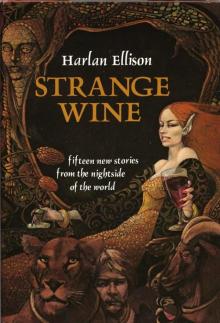 Strange Wine
Strange Wine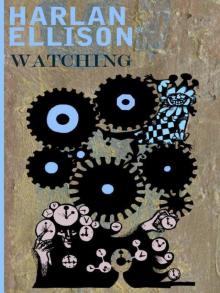 Harlan Ellison's Watching
Harlan Ellison's Watching Over the Edge/An Edge in My Voice
Over the Edge/An Edge in My Voice Troublemakers: Stories by Harlan Ellison
Troublemakers: Stories by Harlan Ellison Gentleman Junkie and Other Stories of the Hung-Up Generation
Gentleman Junkie and Other Stories of the Hung-Up Generation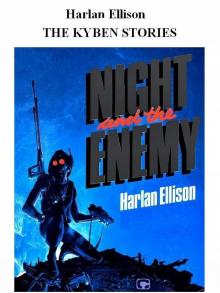 The Kyben Stories
The Kyben Stories From the Land of Fear
From the Land of Fear The Top of the Volcano: The Award-Winning Stories of Harlan Ellison
The Top of the Volcano: The Award-Winning Stories of Harlan Ellison Sleepless Nights in the Procrustean Bed
Sleepless Nights in the Procrustean Bed Ellison Wonderland
Ellison Wonderland Children of the Streets
Children of the Streets Can & Can'tankerous
Can & Can'tankerous Love Ain't Nothing but Sex Misspelled
Love Ain't Nothing but Sex Misspelled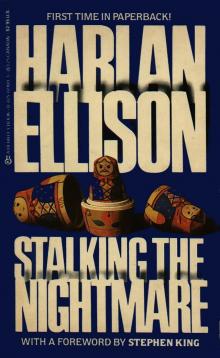 Stalking the Nightmare
Stalking the Nightmare Approaching Oblivion
Approaching Oblivion Deathbird Stories
Deathbird Stories Partners in Wonder
Partners in Wonder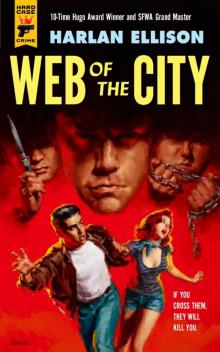 Web of the City
Web of the City Spider Kiss
Spider Kiss A Boy and His Dog
A Boy and His Dog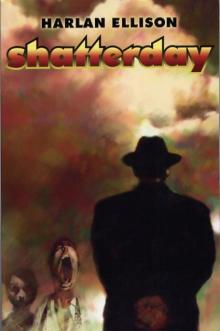 Shatterday
Shatterday Slippage: Previously Uncollected, Precariously Poised Stories
Slippage: Previously Uncollected, Precariously Poised Stories Repent, Harlequin! Said the Ticktockman
Repent, Harlequin! Said the Ticktockman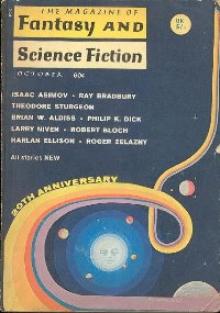 Come to Me Not in Winter's White
Come to Me Not in Winter's White The Song the Zombie Sang
The Song the Zombie Sang The Other Glass Teat
The Other Glass Teat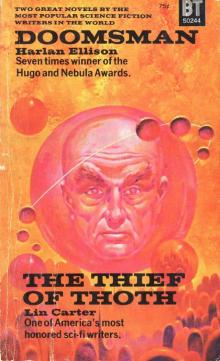 Doomsman - the Theif of Thoth
Doomsman - the Theif of Thoth The City on the Edge of Forever
The City on the Edge of Forever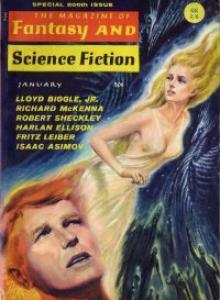 I See a Man Sitting on a Chair, and the Chair Is Biting His Leg
I See a Man Sitting on a Chair, and the Chair Is Biting His Leg The Harlan Ellison Hornbook
The Harlan Ellison Hornbook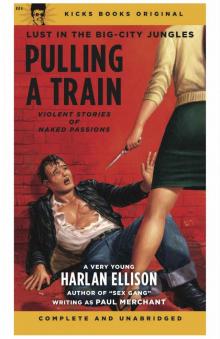 Pulling A Train
Pulling A Train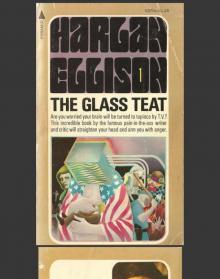 The Glass Teat - essays of opinion on the subject of television
The Glass Teat - essays of opinion on the subject of television An Edge in My Voice
An Edge in My Voice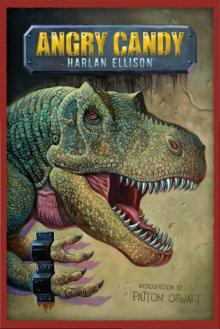 Angry Candy
Angry Candy Troublemakers
Troublemakers The Top of the Volcano
The Top of the Volcano Over the Edge
Over the Edge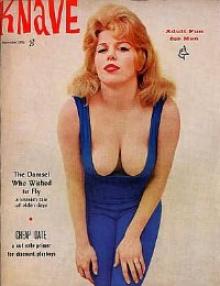 Survivor #1
Survivor #1 Slippage
Slippage